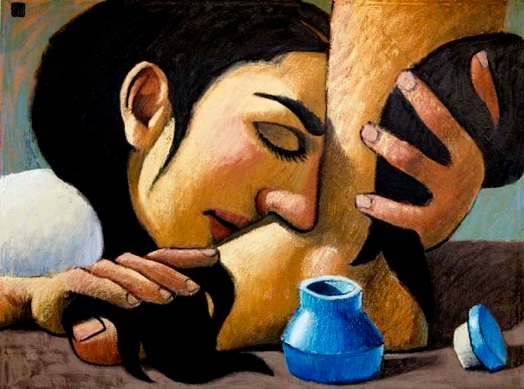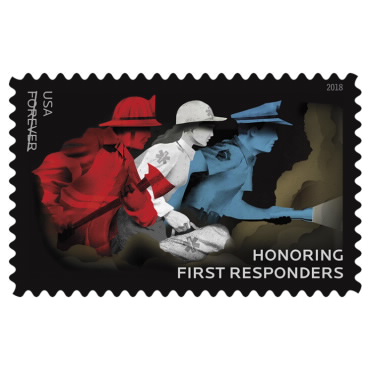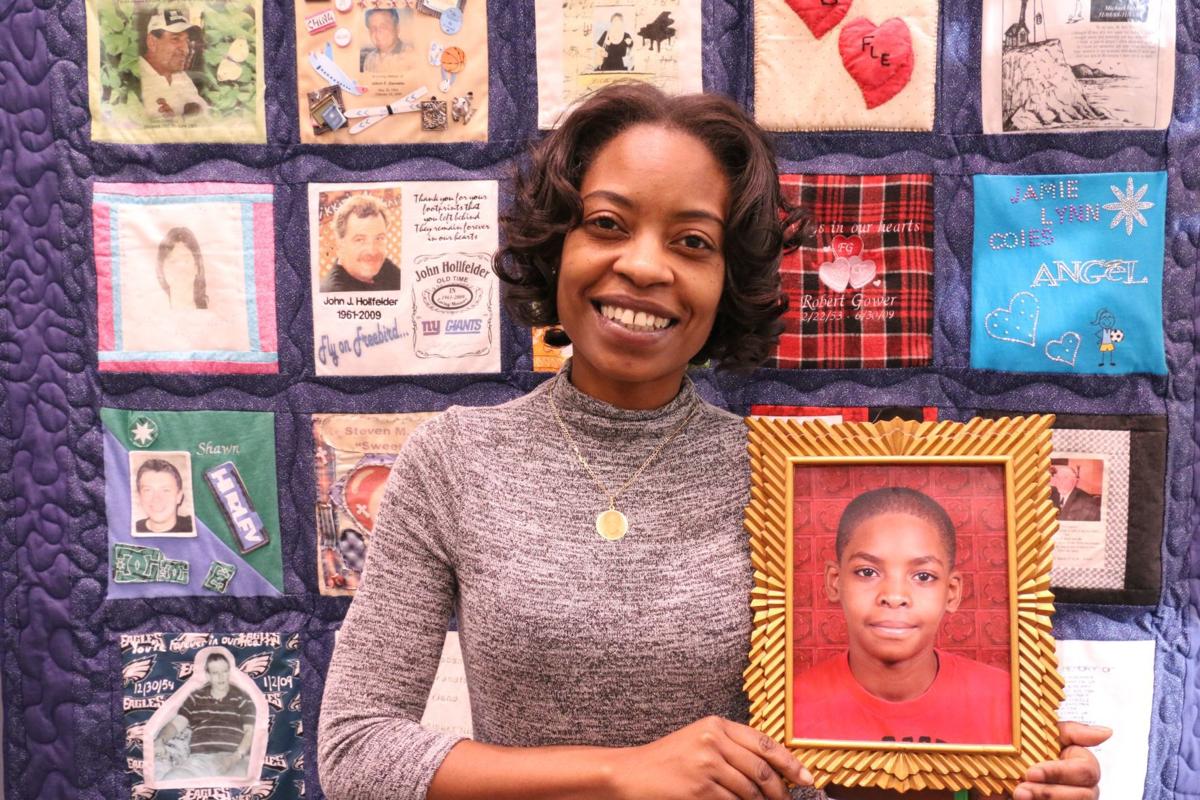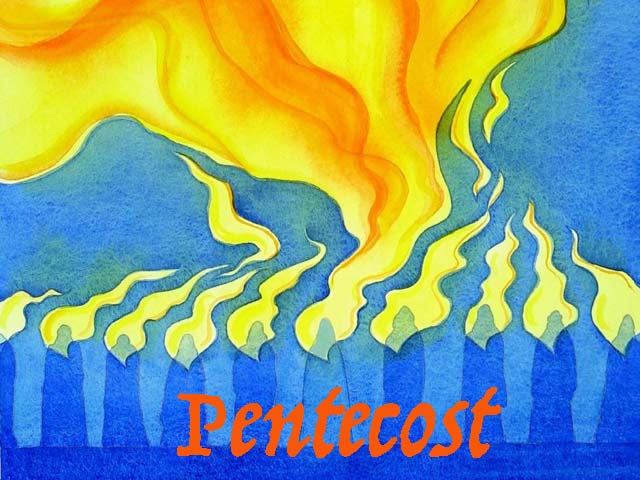Love on the move. Themes from Gospel of John
Bending down to wash and anoint someone’s feet. What story do our feet tell about us? How we live? How do we love? How do we touch the earth?
Indeed, what amazing gifts might must be ours if we could kneel and honor the humanity in another? I imagine we might just start to see the holy there as well. — Janet Hunt
My Grandmother Washes Her Feet
in the Sink of the Bathroom at Sears (excerpt) — Mohja Kahf My grandmother puts her feet in the sink of the bathroom at Sears to wash them in the ritual washing for prayer, wudu, because she has to pray in the store or miss the mandatory prayer time for Muslims She does it with great poise, balancing herself with one plump matronly arm against the automated hot-air hand dryer, after having removed her support knee-highs and laid them aside, folded in thirds, and given me her purse and her packages to hold so she can accomplish this august ritual and given me her purse and her packages to hold
so she can accomplish this august ritual
and get back to the ritual of shopping for housewares
Respectable Sears matrons shake their heads and frown
as they notice what my grandmother is doing,
an affront to American porcelain,
a contamination of American Standards
by something foreign and unhygienic
requiring civic action and possible use of disinfectant spray
They fluster about and flutter their hands and I can see
a clash of civilizations brewing in the Sears bathroom …
Standing between the door and the mirror, I can see
at multiple angles, my grandmother and the other shoppers,
all of them decent and goodhearted women, diligent
in cleanliness, grooming, and decorum …
On Feet: Walking and Washing

I would say that there exist a thousand unbreakable links between each
of us and everything else, and that our dignity and our chances are one.
The farthest star and the mud at our feet are a family; and there is no
decency or sense in honoring one thing, or a few things, and then
closing the list. The pine tree, the leopard, the Platte River, and
ourselves – we are at risk together, or we are on our way to a
sustainable world together. We are each other’s destiny. — Mary Oliver
And forget not that the earth delights to feel your bare feet and the winds long to play with your hair … ― Khalil Gibran, The Prophet
Be sure you put your feet in the right place, then stand firm. — Abraham Lincoln
What does love look like? It has the hands to help others. It has the
feet to hasten to the poor and needy. It has eyes to see misery and
want. It has the ears to hear the sighs and sorrows of men. That is what
love looks like. — Saint Augustine
You have brains in your head. You have feet in your shoes. You can steer
yourself in any direction you choose. You’re on your own, and you know
what you know. And you are the guy who’ll decide where to go. — Dr. Seuss
When food comes you open your mouth; when sleep comes you close your
eyes. As you wash your face you find your nose, when you take off your
shoes you feel your feet. At that time, if you miss what’s being said,
take a torch and make a special search deep in the night. How can you
attain union? — Joshu
The greatest form of praise is the sound of consecrated feet seeking out the lost and helpless. — Billy Graham
Look up at the stars and not down at your feet. Try to make sense of
what you see, and wonder about what makes the universe exist. Be
curious. — Stephen Hawking
This is love: to fly toward a secret sky, to cause a hundred veils to
fall each moment. First to let go of life. Finally, to take a step
without feet. — Rumi
… Walking meditation is really to enjoy the walking — walking not in
order to arrive, just for walking. The purpose is to be in the present
moment and enjoy each step you make. Therefore you have to shake off all
worries and anxieties, not thinking of the future, not thinking of the
past, just enjoying the present moment. … We walk all the time, but
usually it is more like running. Our hurried steps print anxiety and
sorrow on the Earth. If we can take one step in peace, we can take two,
three, four, and then five steps for the peace and happiness of
humankind. … If we can transform our walking path into a field for
meditation, our feet will take every step in full awareness. Our
breathing will be in harmony with our steps, and our mind will naturally
be at ease. Every step we take will reinforce our peace and joy and
cause a stream of calm energy to flow through us. — Thich Nhat Hanh
From our feet, we can tell how the rest of our body is doing. The way we
follow the Lord reveals how our heart is faring. The wounds on our
feet, our sprains and our weariness, are signs of how we have followed
Him, of the paths we have taken in seeking the lost sheep and in leading
the flock to green pastures and still waters. The Lord washes us and
cleanses us of all the dirt our feet have accumulated in following Him.
This is something holy. Do not let your feet remain dirty. Like battle
wounds, the Lord kisses them and washes away the grime of our labors. — Pope Francis
Extravagant Love: Washing and Anointing
… we don’t separate a self from its environment, and cleaning expresses
our respect for and sense of wholeness with the world that surrounds us.
— Shoukei Matsumoto
A monk asked Joshu, “I have just entered the monastery: please give me
some guidance.” Joshu said, “Have you had breakfast yet?”
The monk said, “Yes I have eaten.” Joshu continues, “Then go wash your bowl.”
— Joshu, Buddhist Koan
In this text, Mary continues the theme of extravagance in the form of costly gestures involving expensive ointment. … Now is no time for frugality. This extravagance on earth is participating with the work of heaven. — Lynn Miller
Do you see this person that you are judging? Do you see her humanity, her profound child of God-ness, her generosity, her capacity for compassion? — Joy Perkett
Sounds
like a horrible idea to me, trying to get closer to God. Half the
time, I wish God would leave me alone. Getting closer to God might mean
getting told to love someone I don’t even like, or give away even more
of my money.It might mean letting some idea or dream that is dear to me
get ripped away. — Nadia Bolz-Weber
So Mary might have given Jesus this stunning gift of extravagance as a
thank-you or as a prophetic witness as to what would soon be. Perhaps
her motivation was a mixture of both. But what if another reason Mary
poured it all out that day was simply because she knew deep down that
her gift would make a holy difference to Jesus. Her gift, her generous
offering, could remind him who he was and how much he was loved. — Shannon J. Kershner
What
amazing and wonderful thing can she do, what can she say not with words
but with her whole self: Mary takes the best she has to give and in an
hour of need, as death looms over this little band of disciples, Mary
takes the best and breaks it open over the feet of Jesus, the one she
loves, the one she is about to lose…even if only for awhile…but we
suspect she does not know that, yet. — Kathryn Matthews
Then again, we might ask whom God might work through next. And if you
ask that question, then invite your people to look at those sitting near
them. For God may be about to use each of them in a surprising way to
care for their neighbor, to offer a listening ear, to do their work with
faithfulness and courage, to stand up for those who are less fortunate,
to resist peer pressure at school and offer an alternative to those
watching. Who knows? What we do know is that God is regularly about the
business of surprising us with where God shows up, whom God uses, and
what God accomplishes. — David Lose
Mary’s extravagant love for Jesus makes it possible for Jesus to show
extravagant love in what follows — washing the feet of his disciples,
handing himself over to be arrested in the garden, carrying his own
cross, dying, rising, and ascending. Mary loves Jesus into his future as
the fulfillment of, “for God so loved the world.” — Karoline Lewis
Jesus’ commandment to love one another is not a commandment to feel
affection, but a commandment to act in a loving way, even when we would
rather do otherwise. — Elisabeth Johnson
Remembering her may help them leave him alone while he finishes delivering his message. At home in Bethany, the storm clouds are still piling up against the door when Mary gives the forecast: it will be bad, very bad, but that’s no reason for Jesus’ friends to lock their hearts and head to the cellar. Whatever they need, there will be enough to go around. Whatever they spend, there will be plenty left over. There is no reason to fear running out–of nard or of life either one–for where God is concerned, there is always more than we can ask or imagine–gifts from our lavish, lavish Lord. — Barbara Brown Taylor
Reflections on Advent 4: Love (plus longest night, resistance songs, Blue Christmas)
This
week, Mary’s song, one of four found in the Gospel of Luke, is a song
of praise and resistance, an expectation for justice and change. In
times when we wonder whether to expect transformation, we are reminded
to work for change, and to recall that we are lights in the darkness.
How will you shine in this season and into the coming year?
Les Miserables – Great Crescendo (excerpt)
Do you hear the people sing? Singing a song of angry men?
It is the music of a people, Who will not be slaves again!
When the beating of your heart, Echoes the beating of the drums
There is a life about to start, When tomorrow comes!
Do you hear the people sing, Lost in the valley of the night?
It is the music of a people, Who are climbing to the light
For the wretched of the earth, There is a flame that never dies
Even the darkest night will end, And the sun will rise.
For those Living with Grief & Loss
I hear
the love of those
who have loved me
echo in me.
All the notes of my song
sing over theirs,
the only kind of beauty.
The song does not die.
May I live
with love and mercy
for it will echo
long after.
— Steve Garnaas-Holmes
AGAPE as LOVE
The essence of agape love is goodwill, benevolence, and willful delight in the object of love. — Got Questions
True transformation is when we unleash the power of agape. We create an environment for positive change. There is still a world of possibility, even when the worst thing happens that could possibly happen. Forgiveness gives me the capacity to contribute something of value—to create a positive outcome to a terrible tragedy. —Desmond Tutu
Our hearts are like diamonds because they have the capacity to express divine light, which is agape; we not only are portals for this agape, but are made of it. — Anne Lamott
I’m a little pencil in the hand of a writing God, who is sending a love letter to the world. ― Mother Teresa
The beginning of love is to let those we love be perfectly themselves, and not to twist them to fit our own image. Otherwise we love only the reflection of ourselves we find in them. — Thomas Merton
All, everything that I understand, I understand only because I love. — Leo Tolstoy
Agape is a sobering love to receive, for it says, ‘If I cannot love you for who you are, then I will do so despite who you are.’ It is unique in that it is able to love those whom it cannot like. ― James Castleton, Mending of a Broken Heart
The ultimate lesson all of us have to learn is unconditional love, which includes not only others but ourselves as well. — Elisabeth Kubler-Ross
If you pour a handful of salt into a cup of water, the water becomes undrinkable. But if you pour the salt into a river, people can continue to draw the water to cook, wash, and drink. The river is immense, and it has the capacity to receive, embrace, and transform. When our hearts are small, our understanding and compassion are limited, and we suffer. We can’t accept or tolerate others and their shortcomings, and we demand that they change. But when our hearts expand, these same things don’t make us suffer anymore. We have a lot of understanding and compassion and can embrace others. We accept others as they are, and then they have a chance to transform. — Thich Nhat Hahn
LONGEST NIGHT: Of Moons & Stars – Light in Darkness –
We are a way for the universe to know itself. Some part of our being knows this is where we came from. We long to return. And we can, because the cosmos is also within us. We’re made of star stuff. — Carl Sagan
To know the dark, go dark. Go without sight, and find that the dark, too, blooms and sings. — Wendell Berry
You must have shadow and light source both. Listen, and lay your head under the tree of awe. — Rumi
We go into the darkness, we seek initiation, in order to know directly how the roots of all beings are tied together: how we are related to all things, how this relationship expresses itself in terms of interdependence. — Joan Halifax
Enlightenment is like the moon reflected on the water.
The moon does not get wet, nor is the water broken.
Although its light is wide and great,
The moon is reflected even in a puddle an inch wide.
The whole moon and the entire sky
Are reflected in one dewdrop on the grass. — Dogen
Is the sweetness of the cane sweeter,
Than the One who made the canefield?
Behind the beauty of the moon is the MoonMaker.
There is Intelligence inside the ocean’s intelligence
Feeding our love like an invisible waterwheel … ― Rumi
The pine tree of Shiogoshi / Trickles all night long / Shiny drops of moonlight. — Basho
… [Sagan’s] statement sums up the fact that the carbon, nitrogen and oxygen atoms in our bodies, as well as atoms of all other heavy elements, were created in previous generations of stars over 4.5 billion years ago. Because humans and every other animal as well as most of the matter on Earth contain these elements, we are literally made of star stuff, said Chris Impey, professor of astronomy at the University of Arizona. “All organic matter containing carbon was produced originally in stars. The universe was originally hydrogen and helium, the carbon was made subsequently, over billions of years.” … In 2002, music artist Moby released “We Are All Made of Stars,” explaining during a press interview that his lyrics were inspired by quantum physics. “On a basic quantum level, all the matter in the universe is essentially made up of stardust,” he said. — Remy Melina, Are We Really All Made of Stars? Live Science (excerpt)
SONGS of RESISTANCE: Commentary
Why,
one might wonder, all these songs? Because singing is an act of
resistance. That’s not to say that all singing is, of course. Sometimes
it’s an act of joy and sometimes of camaraderie, but it’s also an act of
resistance. The slaves knew this. When they sang their spirituals they
were both praising God and protesting the masters who locked them out of
worship but couldn’t keep them out of the promise of deliverance of the
Bible. And the civil rights leaders knew this, too, singing songs like
“We Shall Overcome,” when so many in the society didn’t give them a
chance to advance their cause of justice, let alone triumph. — David Lose, Singing as an Act of Resistance (excerpt)
I wonder whether we would dare to sing the Magnificat today. What would it mean? — Richard Ascough
It’s easy to sing the song, but to pray the lyrics from deep within … that’s worship! — Gangai Victor
Who can resist … the story of Mary’s elegantly exuberant prayer, the
Magnificat? Her spontaneous outburst in song echoes Hannah’s praise for
God’s marvelous deeds in the lives of all who are marginalized or
downtrodden (1 Samuel 2). Like Hannah, Mary sings out of her own
experience, her own hope, but out of the experience and hope of her
people as well. The Magnificat is a lovely expression of joy at God’s
promises kept, a celebration of the tables being turned, or overturned:
the lowly are lifted up, the proud are brought down, and the hungry are
fed. God remembers the people of Israel, and the promises God has made
to them. What a powerful text for every heart hungry … Kathryn Matthews (excerpt, UCC Sermon Seeds Dec 23 Reflection)
One thing we do know: music in the United States has led directly to
environmental action, the equality of our citizens, a movement against
war and violence, and it has raised the voices of the working American
… Powerful songs have always been the engine behind the greatest
social movements — it is the marching soundtrack that unites the people
and gives them focus and resolve, and it’s not limited to the U.S. In
1970s Nigeria, Fela Kuti invented Afro Beat music as a way to protest
the oil company regime of Nigeria. His song “Zombie” became a global hit
that railed against Nigeria’s military dictators. In South Africa, the
indigenous Mbatanga music helped bring about the end of apartheid and it
spread a message of peace and reconciliation in that nation. In Chile,
Victor Jara wrote songs about his country’s struggles, sparking the
Nueva Cancion (New Songs) movement that caused South Americans to rise
up against their military dictatorships and replace them with
democracies. In Brazil, the Tropicalia movement was created by
songwriters like Caetano Veloso, Gilberto Gil, and Rita Lee as a form of
protest against the Brazilian military junta, which eventually fell
from its own corruption and incompetence. In Australia and New Zealand,
popular songs written by indigenous and non-ingenious songwriters
sparked an indigenous land reclamation movement that is still active
today. — Barrett Martin, Huffington Post (excerpt)
Throughout the ages, God’s people have faced oppression. And in the face of that oppression, God’s people have sung God’s songs of resistance. But God’s people have also been oppressors. We have enslaved others — and each other. We have stolen from, oppressed, and slain others — and each other. And when we have done so, the oppressed, the enslaved, the persecuted have sung God’s songs of resistance against us. — Rolf Jacobson
Reflections on First Responders and ‘Losing Life to Gain Life’
Reflections on first responders in anticipation of First Responders Sunday (Sept 16 at Jackson Community Church) and ‘losing life to gain life’ as themes from Mark 8.
I find myself wondering: How do we discern what we should be fierce about? How do we choose what we will hold on to, and what we need to release? … Some crosses are made of what we take on; some crosses are made of what we let go … Where is this place in your own life? How do you discern what you will hold on to, what you will claim and fight for, and what you will release? How does this choosing, this discerning, draw you closer to … what God might imagine for your life? — Jan Richardson
Continue reading “Reflections on First Responders and ‘Losing Life to Gain Life’”
Reflections on action & service: advocating and helping others and ourselves. Themes from Jame 2 and Matthew 7.
The best way to find yourself is to lose yourself in the service of others. — Gandhi
Have you ever experienced a “work of mercy” (“good deeds for the benefit of the neighbor”) to be a two-way street? — Tanya Barnett
Prayer
Lord make me an instrument of your peace
Where there is hatred let me sow love
Where there is injury, pardon
Where there is doubt, faith
Where there is despair, hope
Where there is darkness, light
And where there is sadness, joy
O divine master grant that I may
not so much seek to be consoled as to console
to be understood as to understand
To be loved as to love
For it is in giving that we receive
it is in pardoning that we are pardoned
And it’s in dying that we are born to eternal life
— St Francis of Assisi
The Good You Do: Taking Action
It is not enough to be compassionate: you must act. — The Dalai Lama
Continue reading “Reflections on action & service: advocating and helping others and ourselves. Themes from Jame 2 and Matthew 7.”
Pentecost: themes of Holy Spirit setting communities and individuals afire to dream and act, to be heard and understood.
 In this Pentecost week, are you seeking the presence of others who will deepen your understanding? Where do you go to hear and see what you cannot hear and see on your own? When knowledge and wisdom come to you, how do you share them beyond yourself to help others flourish? Where are you turning your ears, your eyes, your heart, your mind to perceive the presence of the Spirit and the path to which it is drawing you? — Jan Richardson
In this Pentecost week, are you seeking the presence of others who will deepen your understanding? Where do you go to hear and see what you cannot hear and see on your own? When knowledge and wisdom come to you, how do you share them beyond yourself to help others flourish? Where are you turning your ears, your eyes, your heart, your mind to perceive the presence of the Spirit and the path to which it is drawing you? — Jan RichardsonEverything’s been said … Of course, they run away from the flame,
Pentecost: Holy Spirit as Fire, Wind, Dreams & Revolution
On Pentecost, may you find your heart singing with the spirit of God, your ears humming with the voice of the Spirit speaking in a language that reaches deep into your soul and wisdom dawning on your mind so that the shackles that have hardened around your mind may be broken, and God’s voice and language set free. — Mark Suriano, Sermon Seeds
… the Holy Spirit isn’t comforting anyone or anything but instead is shaking things up … The Spirit doesn’t take away our problems or make all things right. Rather, the Spirit instead helps us name the inward hopes, desires, and longings that attend anyone who is waiting for God’s redemption. The pain of creation can seem so great and the coming of God’s redemption so far away that the Spirit intervenes, interrupts, and intercedes by giving voice to our deepest needs. — David Lose
Rather, God spoke in the vernacular of the everyday and the everywhere … Any time a language or a voice crying out is suppressed, it is God’s voice, too, we are attempting to silence. We might do well to participate in Pentecost with this in mind, listening for the voice of God among the silenced, the powerless, the ignored, the forgotten, the oppressed, the nobodie. … Pentecost was a rebellion against those that would seek to restrict God to a single, respectable or official language of a single, righteous people or a single, systematic theology. Pentecost was a protest in which God refused to be silenced by the language of the powerful. Instead, on Pentecost, God spoke. And the people in the streets understood. — David Henson, Edges of Faith
Pentecost is an invitation to dream … Like any good dream, these dreams involve adopting a new perspective on what’s possible, rousing our creativity to free us from conventional expectations. They help us see that maybe what we thought was outlandish actually lies within reach. Maybe I can find freedom from what binds me. Maybe there can be justice. Maybe I can make a difference. Maybe a person’s value isn’t determined by her income. Maybe the future of our economy or our society or our planet is not yet determined. Maybe God is here with me, even if my current struggles never go away … And even when this community’s dreams are smaller, more localized or slower to develop, they can still be revolutionary. — Matthew Skinner, HuffingtonPost
Pentecost demands that we listen with a willing heart, and that we open ourselves to ongoing radical transformation. We discover that the pilgrimage does not end here; instead we are called to a new one of sharing our gifts with the world. Soul work is always challenging and calls us beyond our comfort zone. — Christine Valters Paintner, Patheos
… I wonder what it would be like if the Church allowed the Holy Spirit to transform it into a place of deep and implicit belonging — not for the few, but for everyone. — Debie Thomas
On Fire
Do not feel lonely, the entire universe is inside you.
Stop acting so small. You are the universe in ecstatic motion.
Set your life on fire. Seek those who fan your flames.
— attributed to Rumi
Love in its essence is spiritual fire. — Seneca
The most powerful weapon on earth is the human soul on fire. — Ferdinand Foch
Heat cannot be separated from fire, nor beauty from the eternal. — Dante Alighieri
It is not light that we need, but fire; it is not the gentle shower, but thunder. We need the storm, the whirlwind, and the earthquake. — Frederick Douglass
We cannot tear out a single page of our life, but we can throw the whole book in the fire. — George Sand
You kindled me, heap of ashes that I am, into fire. — Cassandra Clare
at night when no one else is alive or awake
however you choose to see it and I live in my own flames
sometimes burning too bright and too wild
to make things last or handle myself or anyone else
and so I run. run run run
far and wide until my bones ache and lungs split
and it feels good. Hear that people? It feels good …
― Charlotte Eriksson
Keep a little fire burning; however small, however hidden. ― Cormac McCarthy, The Road
If you’re going to try, go all the way. There is no other feeling like that. You will be alone with the gods, and the nights will flame with fire. You will ride life straight to perfect laughter. It’s the only good fight there is. ― Charles Bukowski, Factotum
There may be a great fire in our soul, yet no one ever comes to warm himself at it, and the passers-by see only a wisp of smoke. ― attributed to Vincent van Gogh
He might get burned, but he’s in the game.
And once he’s in, he can’t go back, he’ll
Beat his wings ’til he burns them black…
No, The Moth don’t care when he sees The Flame …
The Moth don’t care if The Flame is real,
‘Cause Flame and Moth got a sweetheart deal.
And nothing fuels a good flirtation,
Like Need and Anger and Desperation…
No, The Moth don’t care if The Flame is real …
― Aimee Mann




